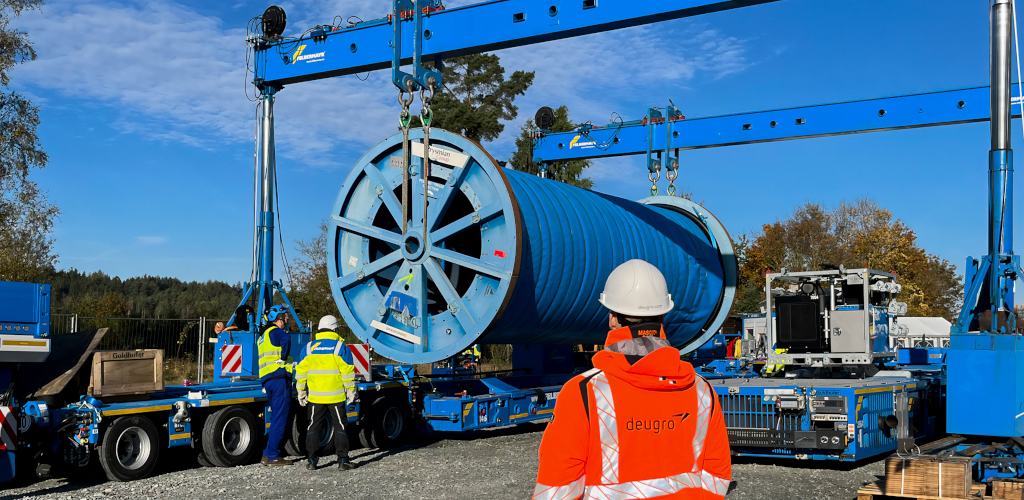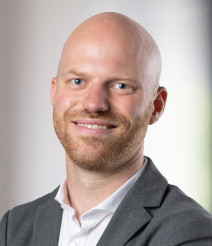Simon Junker Reveals the Scale and Logistics Behind the SuedOstLink Project

By Simon West
deugro has launched the first cable drum deliveries for SuedOstLink, one of Germany’s central energy transition projects. Over the next three and a half years, more than 800 drums each the size of a single-decker bus will make their way from deugro-operated yards to 120 sites across Bavaria. We caught up with Simon Junker, head of cable projects – renewable energy at deugro Germany, to discover more about the scope and logistics behind the project.
From Issue 3, 2025 of Breakbulk Magazine.
Q: This project required over two years of planning – what were the biggest logistical challenges you had to anticipate and solve before the first cable drum delivery?
 SJ: The biggest challenge was the research and development of the required technical equipment, including, and with a focus on, the unspooling device. Additionally, extensive route surveys had to be performed in order to identify the most suitable routes, and for the evaluation of potential and required trailer re-loading areas. This included obtaining permits, as many of these areas were located on private land and had to be rented for this purpose.
SJ: The biggest challenge was the research and development of the required technical equipment, including, and with a focus on, the unspooling device. Additionally, extensive route surveys had to be performed in order to identify the most suitable routes, and for the evaluation of potential and required trailer re-loading areas. This included obtaining permits, as many of these areas were located on private land and had to be rented for this purpose.
Furthermore, to ensure smooth processes in the planning approval procedure, we had to apply for dummy permits – permits that are applied for and checked by the authorities but are not issued. In this way, it is checked and ensured that all critical permits can be issued timely in accordance with the project implementation based on the information submitted.
Q: The cable drums are transported and unspooled directly from the transport configuration – how did you develop and test the customized unspooling solution?
SJ: For the optimized unspooling solution, we carefully evaluated and selected trucking partners who developed the most suitable solution in collaboration with specialized vehicle technicians. Each cable drum is positioned on four rollers on which it can rotate evenly during unspooling. This purpose-built unspooling device is flexible and can be used for different transport configurations for this project.
Q: Bavaria’s hilly terrain and infrastructure constraints add complexity to deliveries. What routing or transport strategies are being used to navigate these challenges?
SJ: To navigate these constraints, we arranged for comprehensive route surveys. These served as a basis for developing tailored transport solutions, such as using specialized equipment like a variety of self-propelled modular trailers, etc. In close cooperation with dteq Transport Engineering Solutions and our partners, we arranged for detailed and engineered calculations and simulations of how to overcome certain inclinations, among others. These were supplemented by driving tests simulating the equipment’s maneuverability with different inclinations and on different surfaces.
Q: How did deugro plan and coordinate the complex transloading process required for the cable drums?
-credit-deugro_2.jpg) SJ: The biggest challenge in preparing the transloading processes was the identification of the most suited transloading areas in regard to predefined parameters such as inclination and ground pressure. This required a variety of transport engineering studies encompassing many different calculations, simulations and swept path analyses.
SJ: The biggest challenge in preparing the transloading processes was the identification of the most suited transloading areas in regard to predefined parameters such as inclination and ground pressure. This required a variety of transport engineering studies encompassing many different calculations, simulations and swept path analyses.
Q: This project involves numerous stakeholders, some of whom were unfamiliar with special transport. How did deugro facilitate coordination and awareness training?
SJ: Through a large number of training sessions at our partners’ offices as well as with our partners on site, we were able to demonstrate the complexity of the individual operational steps, including all aspects relevant to quality, health, safety, environment and security. We were also able to create awareness of the subsequent project processes. These trainings were and are paramount for the project’s execution.
Q: As deliveries continue over the next three-and-a-half years, what lessons from the early phases are shaping your approach moving forward?
SJ: In such extensive projects, which bring together specialists from a wide variety of fields, it is crucial to create close communication channels that ensure all relevant information is being passed on to all those involved in a complete and timely manner. At the same time, this creates a considerable exchange of knowledge and experience, which offers many advantages for all partners involved when it comes to similar projects in the future.
deugro will be exhibiting at Breakbulk Europe on 13-15 May in Rotterdam.
Top photo: Transferring a cable drum from a long to a short vehicle at one of the reloading locations. Credit: deugro
Second: Simon Junker, head of cable projects – renewable energy at deugro Germany. Credit: deugro
Third: Unspooling operations at the destination. Credit: deugro
